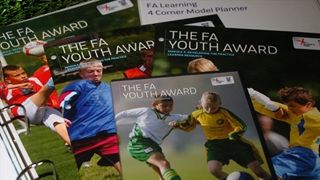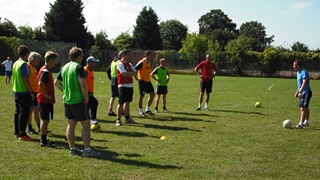
The FA’s Jamie Bradbury has taken his latest steps along the Coaching Pathway by spending the weekend on the first two days of The FA Youth Award Module Two course. He looks back on how things went...
Two years ago I was like a man possessed as I finally began the Level Two coaching award.
It is an intensive course and it really got me hooked, so much so that, with my final assessment still to do I’d already enrolled on the first part of the new FA Youth Award course.
That was late 2012, and after enjoying those four days with Essex FA thinking about ‘Developing the Environment’, I can hardly believe that nearly 18 months passed before I returned for the next step ‘Developing the Practice’.
That’s not to say I’ve not been learning. I’ve gained a lot of experience on the training pitch in that time, coaching the team I’m player-manager for, and also coaching four to 10-year-olds in a football club I’ve set up for kids in my village.
In the last two years I’ve really been able to put into practise the things I have learned on the courses, allied with over 25 years' experience playing the game at various levels.
Time flies, and when I arrived back at the venue in Colchester on Friday it felt like only yesterday that we gathered there for the Module One course.
It was good to see Essex FA’s Gary Piggott back in the hot-seat as course tutor, but this time he was joined by Alan Ackrell, who I’d not met before but had heard many a good word about.
There were also some familiar faces amongst the candidates. I’d been on previous courses with half a dozen of them, while my club’s former chairman was also there, in his new guise as manager of one of Colchester’s youth football clubs.
Even before things got going, it’s with like-minded, passionate people where you really start to learn, picking up snippets from others about how they do things, what works, what doesn’t. You could easily spend a day chatting about the game and about coaching. It’s a stimulating environment to be in.
As with most courses, the candidates come from many different football backgrounds. There were coaches from Tottenham Hotspur and Thurrock, but also local grassroots teams. Those who were born with game in their blood, others who were relatively new to football. But one thing that we all shared was a desire to help kids get the most out of football.
Our introduction to the first of four days was to think back to Module One and what we’d learned. As well as the technical aspects of a child’s development, the main thing I took was the alternative approach to communicating with the players.
While Level Two looks at developing players and teams from a technical perspective, almost prescriptively, the Youth Modules promotes the idea of coaches encouraging the players to come up with the answers themselves.
The morning of day one was spent in the classroom, reviewing the tasks in the learner packs while also brainstorming ideas around things like ‘creating a positive environment’.
We were also introduced to the term ‘Practice Spectrum’, which really gets you thinking about the sessions you put on, and more importantly, why.
At the low end of the Practice Spectrum are what are called ‘constant practices’, things like basic passing sessions focused on one specific technique requiring little decision making and with no opposition. Moving further up the spectrum, practices become more variable with more things to think about, for example interference from other players in the session.
At the top end you have random practices, perhaps a small-sided game, which becomes more realistic to a match scenario and involves unpredictable moments and competing with opponents. They can help players develop 'game craft'.
In a five-yard passing practice there won’t be much difference from one pass to the next (constant), but in a game, how often do you ever find yourself dealing with exactly the same situation? (random).
That’s not to say one practice is better or more important than another, but this is where one of the main course mantras comes into play. Use the right practice for the right players at the right time.
If you know what you want to achieve from a session and you have a desired learning outcome, set up practices with that at its heart.
Some practices can progress, as we know, from a constant to a variable, a variable to a random, or even across all three. And in Level Two we are taught about planning sessions in that way, starting with a technique, progressing to the skill, then onto a game-related practice, so it wasn’t new to me, but it gave me another way of thinking about it.
There’s also the ‘whole-part-whole’ concept, where you might begin a session with a game or random practice, take it back to a variable or constant practice focused on your desired outcome, then go back to a game to see the effects of the session.
The different levels of the Spectrum were clearly demonstrated in the practical sessions outside on the 3G later that afternoon.
One of the practices was a passing, moving and turning session which I’ve used with my teams on a few occasions and I think is brilliant on a number of technical and physical levels. And it’s a highly adaptable, variable practice, allowing you to focus on certain outcomes and the needs of the players individually or as a group.
I’ve drawn the session up using the new FA Coach’s App for anyone who’d like to try it for themselves. [click here to download the pdf]
But don’t think this is the right way or the wrong way - there is no such thing. It’s all about the players and what they need. Not about us as coaches.
So the message from day one was: "Let the kids develop in the game. Don’t always feel the need to intervene, set-up a session that works on the desired outcome and be confident enough to let the players work it out for themselves."
On Thursday, Jamie will review day two where ‘developing skill’ was high on the agenda and also a 8v8 session used by Jose Mourinho at Chelsea...
www.footballcommunion.com








